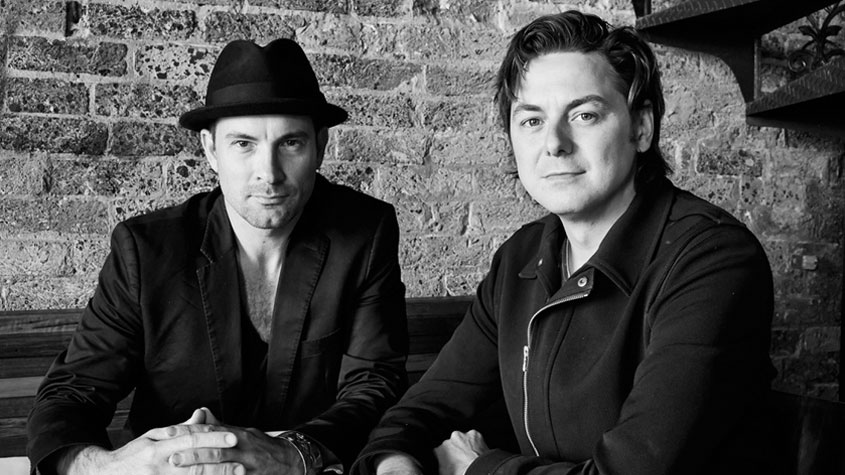Uncanny Valley: at the cutting-edge of music production

Uncanny Valley Music and Technology are at the cutting edge of musical creativity, using artificial intelligence (AI) to reshape the process of creating music. Armed with decades of music industry experience, in 2010, Justin Shave and Charlton Hill established the company, which now composes countless briefs for original and remix commercial music projects. In 2020, Uncanny Valley and colleague Caroline Pegram formed Team Australia and won the first-ever Eurovision AI Song Contest. Charlton Hill introduces Uncanny Valley’s memu platform and discusses the role that intellectual property (IP) plays in this cutting-edge music tech company.
Tell us about Uncanny Valley

We established Uncanny Valley in 2010. Composing music for original and remix commercial music projects has been our core business since then. Over the last ten years, we have evolved into a music and tech company and have forged an augmented creativity approach to the music process. In 2020, we won the first-ever Eurovision AI Song Contest. We have also collaborated with Google’s Creative Lab Sydney on a project called ML tools for Musicians. We have an Advisory Board on AI, made up of University academics and music industry professionals.
We regularly speak at global conferences on the topic of AI and the augmentation of creativity.
Tell us about your product
Our key tech product is called memu, an endless live stream of uniquely composed and produced music. memu utilizes machine learning and augmented intelligence to select and combine music intuitively to create and mix a unique real-time musical experience. The memu engine is very adaptable and can be used in diverse ways, from its collaboration mode with artists and IP holders to individual streams and the option to output large volumes of music. Its architecture has been designed to scale.
memu is an evolving, collaborative ecosystem where contributions from musicians, beatmakers and vocalists are fully trackable, making it possible to harness emotional data and new revenue streams for artists. The memu platform is a prolific and customizable engine. We’re currently using it in a business-to-business (B2B) context providing services on commercial creative technology jobs across an array of sectors while building its business-to-consumer (B2C) interface at the same time.
What sort of music outputs does memu produce?
memu currently plays 24/7; that’s 10,080 minutes of uniquely composed music a week per stream. It generates tracks faster than real-time and can compose 33,600 minutes of music a week, including many individual tracks.
What prompted you to develop it?
The initial driver was our long-term interest in developing an interactive interface that aided composing music. The boom in demand for musical content and the need to complement new storytelling methods with prolific amounts of music, plus a growing need for music personalization, also pushed our plans forward. These are the core elements of the memu engine. Another core motivation was to create a collaborative platform for IP holders to help them maximize and repurpose their IP. memu enables that.
What were the biggest challenges you faced in developing memu and in bringing it to market?
Creating a generative music system is technically challenging. The biggest challenge was deciding on its architecture and underlying logic. We cobbled together our early solutions using existing technologies, but we soon learned that we needed to rebuild our model from the ground. Deciding on its logic and arming ourselves with the right team to build it were critically important. We have also learned a lot about how to present our platform positively. We see it as a positive step towards enabling artists and IP holders to create additional revenue streams from their work.
At what point did you realize intellectual property could support your business?
Our core business is music, so understanding IP and how it can create value is fundamental to all transactions in this business. Justin Shave and I each have a background in singer-songwriting and as music producers, so our familiarity with IP is a strong point for Uncanny Valley.
IP rights underpin every aspect of our memu platform, its proprietary systems, and architecture as well as in the traditional sense of allowing collaborators to track their contributions and get paid for them.
How would you like to see the IP system evolve?
We are working in such a new area, that in many ways, it feels like we are creating a new approach to music revenue streams and IP ownership as we evolve our engine and business model. That’s why, from our point of view, IP offices must be open to discussions on how to reshape existing IP frameworks and to actively participate in conversations around how these legal frameworks can be adapted to work with new models of IP ownership. We have been engaging with WIPO on this topic for over a year now, and it’s always been a positive future-thinking experience, which is excellent.
What advice do you have for other SMEs when it comes to IP?
Always protect your IP. In a world where SMEs need to be agile by design, traditional revenue streams can be a moving target. IP is an asset that can make your business more sustainable.
What are your plans for the future?
We plan to continue improving and growing the memu database and its use across a variety of industries. Our user experience (UX) will soon be in place. This means users will have the ability to input and make changes to tracks and individualize their streams and any artists or IP holders who work with us. The scope for ‘fan engagement’ is huge and exciting.